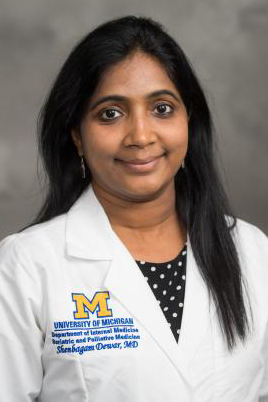July 10, 2020
Shenbagam Dewar, MBBS, Assistant Professor in the Division of Geriatric and Palliative Medicine, is a geriatrician who provides specialized care for older adults with a wide range of conditions and diseases, with a focus on weight management. The goal of Dr. Dewar’s current research is to develop a multidisciplinary clinical care model to treat obese older adults in an outpatient setting in order to improve their mobility and quality of life. She was recently selected as the inaugural recipient of the Albert G. and Olive H. Schlink Foundation Scholars Award, which is supporting Dr. Dewar in her research efforts. Dr. Dewar completed her fellowship at the Michigan Medicine Geriatric Medicine Fellowship Program and is board certified in Family Medicine, Geriatric Medicine, and Obesity Medicine.
Behind the Scenes with Dr. Shenbagam Dewar

What is your research about?
My clinical research relates to obesity in the aging population. Weight management in older adults differs vastly from that of younger adults and the science of treating obesity in the context of aging is still evolving. My research involves designing an obesity intervention model for use with older adults in an outpatient setting to prevent onset of disability or reduce the burden of disability, and to keep them functional in the community. This work is complex due to multimorbidity that occurs as a result of cumulative disease burden and sarcopenia.
My research also extends into the skilled nursing facilities where we are studying the obesity disease burden as it interfaces with the challenges of rehabilitation and recurrent hospital readmissions.
Read about Dr. Dewar’s latest study that was published in the Journal of General Internal Medicine: “Uptake of Obesity Intensive Behavioral Treatment Codes in Medicare Beneficiaries, 2012–2015”
Why does this area of research speak to you?
Currently, there is no clear consensus on the management of obesity in older adults. However, we do understand that obesity in older adults leads to impairment of mobility, loss of independence, early need for caregiver support, and therefore early institutionalization. It also interferes with quality of life and increases health care cost. There is a dire need for an effective clinical approach to manage this epidemic which transcends to the aging population.
What are your clinical interests?
My clinical interest overlaps with my research interest, which is capturing the multimorbidity burden in obese older adults and designing a clinical care model using a multidisciplinary approach. Since the pathophysiology of obesity involves almost every system in the body over a period of age in years, it warrants a broad-based model to be effective. It also needs an obesity-centered personalized treatment approach as there is immense heterogeneity in the disease process. Over the last two years, I have been developing the obesity-centered Optimal Health Weight and Lifestyle (OHWL) clinic at Turner Geriatric Clinic which is currently in its infancy stage.
How did you become interested in helping older adults affected by obesity?
Being a family physician by training, I happened to witness the elementary school kids struck by the burden of obesity in the inner city of Boston which was going unrecognized by the medical community. This sparked my interest in obesity, although caring for older adults had been my area of interest. I had the opportunity to work with older adults at a Program of All-Inclusive Care for the Elderly (PACE) in Massachusetts. Enrollees in this program still lived in the community, but frail enough to be considered nursing home eligible, where I witnessed young older adults struggling with obesity and its effects on functional muscle loss and mobility. This is when I translated my burning interest in helping those affected by obesity to the other end of the age spectrum.
How do you spend your day when you are seeing patients?
The majority of my clinical work is split between the Geriatrics Inpatient Consult Service at the University Hospital, Turner Geriatric Clinic, and Glacier Hills Senior Living Community. At the Glacier Hills Senior Living Community, my nurse practitioner and I take care of residents across the complete continuum of care ranging from independent living, to assisted living, to the frail, older adults in the long-term care setting (nursing home).
What was your role in Michigan Medicine’s preparation and caring for patients with COVID-19?
I was involved in the implementation of the virtual care for our division during the COVID-19 phase and currently serve as our division’s virtual care champion.
Dr. Dewar is lead author of a paper published in the Journal of the American Geriatrics Society that shares the team’s experience in providing telehealth for patients in a geriatric primary care clinic: “Uptake of Virtual Visits in a Geriatric Primary Care Clinic During the COVID ‐19 Pandemic”.
What part of your job gives you the most satisfaction?
As a geriatrician caring for older adults towards the end of their lives and holding hands with both patients and families, trying to navigate this tough, unprepared for phase and striving to provide peace and comfort, brings me the most satisfaction. As a bariatrician (a physician specializing in the treatment of obesity and related conditions) working with patients with varying degrees of disability and functional loss, due to many reasons, and helping them regain and witness them reexperience life’s lost cherished moments, brings another dimension of satisfaction.
Is there a moment when you knew you had chosen the right career?
Yes, when a patient of mine was able to slowly engage in life with baby steps and she said “Doctor, I feel like I got cured of cancer and starting to live a life”. She had struggled with obesity over the years and was unable to get out of her home for three years, including to her doctor’s appointments, prior to our interdisciplinary team starting to work with her.



